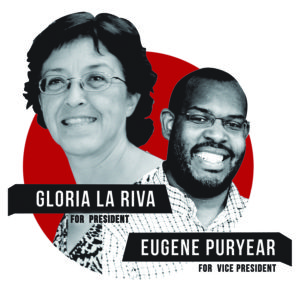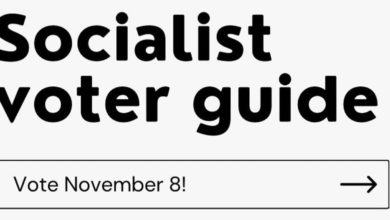 On Aug. 1, the Movement for Black Lives released a sweeping platform laying out demands for major policy reforms, as well as a larger political worldview. Along with reforms to address police brutality and violence, the document speaks to larger societal transformation to meet the social and economic needs of Black people and the U.S. working class. It links the struggle domestically with the struggle against U.S. militarism, and the “ravages of global capitalism,” and proclaims solidarity with the Palestinian people.
On Aug. 1, the Movement for Black Lives released a sweeping platform laying out demands for major policy reforms, as well as a larger political worldview. Along with reforms to address police brutality and violence, the document speaks to larger societal transformation to meet the social and economic needs of Black people and the U.S. working class. It links the struggle domestically with the struggle against U.S. militarism, and the “ravages of global capitalism,” and proclaims solidarity with the Palestinian people.
Party for Socialism and Liberation presidential candidate Gloria La Riva welcomed the release of the Movement for Black Lives platform and voiced her support:
“Our party has been involved with the struggle against police brutality for years and been deeply involved in the Black Lives Matter movement from East to West Coast, to Baton Rouge, where I was recently arrested while demanding justice for Alton Sterling. I have seen how the movement has been attacked and belittled in the corporate media and by mainstream politicians. This document puts to rest their lie that the modern Black freedom movement lacks a clear program.”
“As has been shown throughout U.S. history, the struggle for Black liberation brings into motion all oppressed people. We embrace the vision for a new type of society that is at the core of the Movement for Black Lives platform, which would indeed radically improve the conditions not just for Black people in the United States, but working people of all national backgrounds, and oppressed people worldwide.”
PSL Vice-Presidential candidate Eugene Puryear, a leader of the Stop Police Terror Project in Washington, D.C. said:
“Some corporate politicians like Hillary Clinton, an architect of mass incarceration, have tried to co-opt this movement. But the platform draws a clear line and shows who is really working towards its aims and who is working against it. As the M4BL platform indicates, Black liberation requires the revolutionary transformation of society and that will only happen through protracted, nationwide struggle. We pledge to use our campaign to help advance that process.”
The Movement for Black Lives platform reads, in part:
“Together, we demand an end to the wars against Black people. We demand that the government repair the harms that have been done to Black communities in the form of reparations and targeted long-term investments. We also demand a defunding of the systems and institutions that criminalize and cage us. This document articulates our vision of a fundamentally different world. However, we recognize the need to include policies that address the immediate suffering of Black people. …
“We recognize that not all of our collective needs and visions can be translated into policy, but we understand that policy change is one of many tactics necessary to move us towards the world we envision. We have come together now because we believe it is time to forge a new covenant.”
The six core demands of the Platform are:
1. End the war on Black people: We demand an end to the war against Black people. Since this country’s inception there have been named and unnamed wars on our communities. We demand an end to the criminalization, incarceration, and killing of our people.
2. Reparations: We demand reparations for past and continuing harms. The government, responsible corporations and other institutions that have profited off of the harm they have inflicted on Black people—from colonialism to slavery through food and housing redlining, mass incarceration, and surveillance—must repair the harm done.
3. Divest-Invest: We demand investments in the education, health and safety of Black people, instead of investments in the criminalizing, caging, and harming of Black people. We want investments in Black communities, determined by Black communities, and divestment from exploitative forces including prisons, fossil fuels, police, surveillance and exploitative corporations.
4. Economic justice: We demand economic justice for all and a reconstruction of the economy to ensure Black communities have collective ownership, not merely access.
5. Community Control: We demand a world where those most impacted in our communities control the laws, institutions, and policies that are meant to serve us—from our schools to our local budgets, economies, police departments, and our land—while recognizing that the rights and histories of our Indigenous family must also be respected.
6. Political power: We demand independent Black political power and Black self-determination in all areas of society. We envision a remaking of the current U.S. political system in order to create a real democracy where Black people and all marginalized people can effectively exercise full political power.





